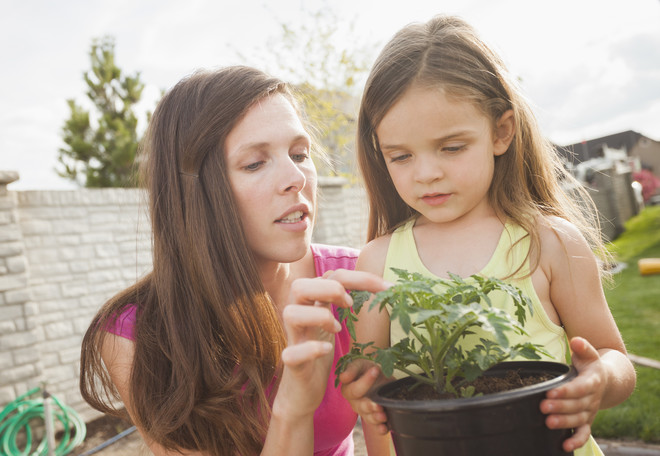- Give, I, you, only you will smear, - Oksanasnatches from a four-year-old daughter a rag, which she is trying to wipe the spilled soup. - Do not climb by the hand. - Cyril grumbles discontentedly at a five-year-old son, who tries to settle down next to a set of daddy screwdrivers. - You will grow up, I will teach you everything. I give the head to cut-off, it will not teach. And Oksana in a couple of years will begin to grumble that she raised a parasite, which without a scandal does not strike a finger on the finger. Because they both made a big mistake - they strangled the aspiration of their children to be assistants. A photo: GettyImages- I was never forced to do anything - it's already remembered 35-year-old Inga. "I'll just get out of bed, she's already dressed for me." We sing - the dishes are washed, I will throw my clothes - I put them away in the closet. I had to learn to cook already in the marriage. For Inga, until now to bring order - this is torture. Therefore, she teaches children to do housework from early childhood. And it looks in the eyes of grandmothers mother-malicious, when forbids them to "serve" their grandsons. Psychologists and teachers assure: it is possible to teach children to help in two years, gradually adding to their duties. Here is just a small list of what you can trust them at different ages. 2-3 years- To remove toys-To bring mother's or to carry things, for example, to put dirty clothes in a basket- Put your clothes on the right shelf- Wipe up spilled water or soup- Wipe dust-Deliver small, light packages to home or from the threshold to the kitchen- Vacuum (my son just loved to run around with a buzzing "monster" around the apartment)
A photo: GettyImages- I was never forced to do anything - it's already remembered 35-year-old Inga. "I'll just get out of bed, she's already dressed for me." We sing - the dishes are washed, I will throw my clothes - I put them away in the closet. I had to learn to cook already in the marriage. For Inga, until now to bring order - this is torture. Therefore, she teaches children to do housework from early childhood. And it looks in the eyes of grandmothers mother-malicious, when forbids them to "serve" their grandsons. Psychologists and teachers assure: it is possible to teach children to help in two years, gradually adding to their duties. Here is just a small list of what you can trust them at different ages. 2-3 years- To remove toys-To bring mother's or to carry things, for example, to put dirty clothes in a basket- Put your clothes on the right shelf- Wipe up spilled water or soup- Wipe dust-Deliver small, light packages to home or from the threshold to the kitchen- Vacuum (my son just loved to run around with a buzzing "monster" around the apartment) A photo: GettyImages4-5 years- Care for a pet - pour it water, pour food - Care for plants - Clean your bed- Disassemble the dishwasher, at least partially - cutlery and unbreakable items- To put things in the washing machine- Prepare a simple breakfast: pour in flakes of milk or make a sandwich from pre-cut ingredients - Disassemble bags brought from the store- Help the dad with minor repairs around the house 6-7 years- Cover on the table- Sort clothes after washing- Help mom carry on (under the supervision of adults) - Fully fold or disassemble the dishwasher - Cut vegetables, sausage and other simple products (under the supervision of adults) 8-9 years- Handle with a stove - Walk the dog- Go to the store for small purchases- Look after the short-lived time for younger brother or sister
A photo: GettyImages4-5 years- Care for a pet - pour it water, pour food - Care for plants - Clean your bed- Disassemble the dishwasher, at least partially - cutlery and unbreakable items- To put things in the washing machine- Prepare a simple breakfast: pour in flakes of milk or make a sandwich from pre-cut ingredients - Disassemble bags brought from the store- Help the dad with minor repairs around the house 6-7 years- Cover on the table- Sort clothes after washing- Help mom carry on (under the supervision of adults) - Fully fold or disassemble the dishwasher - Cut vegetables, sausage and other simple products (under the supervision of adults) 8-9 years- Handle with a stove - Walk the dog- Go to the store for small purchases- Look after the short-lived time for younger brother or sister Photo: GettyImagesThis is important!— You should never start with an ultimatum, but in a playful form. — At the age of six, you can officially assign certain responsibilities to your child that only he can perform. For example, cleaning up toys, taking care of a flower. But it is important to present it correctly. It is one thing when it is a boring routine. Another thing when “I can rely only on you in this difficult task. Don’t let me down!” At the same time, if he asks for help, you can sometimes help him. Otherwise, he will quite logically refuse if he is asked to help you. — Do not brush off the child if he himself offers to help you. Yes, you will probably have to redo everything after this. But this is work for the future. Be patient. — Do not scold if something does not work out. Poured a lot of extra water, put the dishes in the wrong place, broke something. — Do not pay for homework, but do not punish with it. And, of course, do not encourage by canceling some tasks. Behavior is behavior, but responsibilities have not been cancelled. The exception is when you and your whole family arrange a "day of the saintly lazy person" with the condition that you will definitely do all the chores after the rest. - Set an example. Lazy parents rarely raise hardworking children.
Photo: GettyImagesThis is important!— You should never start with an ultimatum, but in a playful form. — At the age of six, you can officially assign certain responsibilities to your child that only he can perform. For example, cleaning up toys, taking care of a flower. But it is important to present it correctly. It is one thing when it is a boring routine. Another thing when “I can rely only on you in this difficult task. Don’t let me down!” At the same time, if he asks for help, you can sometimes help him. Otherwise, he will quite logically refuse if he is asked to help you. — Do not brush off the child if he himself offers to help you. Yes, you will probably have to redo everything after this. But this is work for the future. Be patient. — Do not scold if something does not work out. Poured a lot of extra water, put the dishes in the wrong place, broke something. — Do not pay for homework, but do not punish with it. And, of course, do not encourage by canceling some tasks. Behavior is behavior, but responsibilities have not been cancelled. The exception is when you and your whole family arrange a "day of the saintly lazy person" with the condition that you will definitely do all the chores after the rest. - Set an example. Lazy parents rarely raise hardworking children.

Making Money with Desserts: Success Stories
Evgeniya Polischuk (Fedutinova) instagram:@evgeniyafedutinovavk.com/janeshomebaking– It all started with baking for family and friends. Gradually, I started posting photos of my baked goods on Instagram – and orders started coming in. I made my first custom-made cake on October 13, 2014, and a little earlier I started making macaroons and cupcakes. You could say that the business “found me”, I am very […]

Soups are cold recipes with photos
Cold cucumber soup with yogurt and lemonsorbet from the chef of the restaurant La Taverna Alexander Zhurkin Photo: Getty Images Ingredients: Plain yoghurt – 125 g Cucumber – 150 g Lemon/lime sorbet – 50 g Cocktail shrimp – 24 g Fresh ginger juice – 1 g Lime juice – 5 g Fresh orange juice – 5 g Parsley – 1 g Pink pepper – 1 g Watercress – […]

barbeque kebab
Pork tenderloin in glaze Photo:Dmitry Bayrak/dbstudioPreparation time: 20 minutes + marinating time.Calories: 454 kcal per serving.For 4 servings: 4 pork tenderloins (approximately 300 g each), 1 onion, 2 cloves of garlic, 1 tsp. lemon zest, 1 tsp. lemon juice, a pinch of ground cumin, coriander and turmeric, 1 tbsp. vegetable […]

Pierre Duacan: dietary recipes: Ducane diet
Beetroot soup Photo:Season’S, Luxury Hotels RepresentationYou will need:· Boiled beetroot – 60 g· Fresh cucumbers – 20 g· Red radish – 20 g· Green onions – 10 g· Egg – 1 pc.· Drinking mineral water – 200 g· Salt – 1 gPreparation:· Boil the egg and beetroot.· Grate the cucumbers, radish and part of the beetroot. Put everything […]





